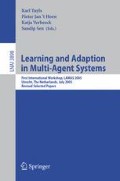Abstract
Use of tags to limit partner selection for playing has been shown to produce stable cooperation in agent populations playing the Prisoner’s Dilemma game. There is, however, a lack of understanding of how and why tags facilitate such cooperation. We start with an empirical investigation that identifies the key dynamics that result in sustainable cooperation in PD. Sufficiently long tags are needed to achieve this effect. A theoretical analysis shows that multiple simulation parameters including tag length, mutation rate and population size will have significant effect on sustaining cooperation. Experiments partially validate these observations. Additionally, we claim that tags only promote mimicking and not coordinated behavior in general, i.e., tags can promote cooperation only if cooperation requires identical actions from all group members. We illustrate the failure of the tag model to sustain cooperation by experimenting with domains where agents need to take complementary actions to maximize payoff.
Access this chapter
Tax calculation will be finalised at checkout
Purchases are for personal use only
Preview
Unable to display preview. Download preview PDF.
References
Banerjee, B., Sen, S., Peng, J.: Fast concurrent reinforcement learners. In: Proceedings of the Seventeenth International Joint Conference on Artificial Intelligence, pp. 825–830 (2001)
Bowling, M., Veloso, M.: Rational and convergent learning in stochastic games. Proceedings of the Seventeenth International Joint Conference on Artificial Intelligence, 1021–1026 (2001)
Claus, C., Boutilier, C.: The dynamics of reinforcement learning in cooperative multiagent systems. In: Proceedings of the Fifteenth National Conference on Artificial Intelligence, pp. 746–752. AAAI Press/MIT Press, Menlo Park (1998)
Hu, J., Wellman, M.P.: Multiagent reinforcement learning: Theoretical framework and an algorithm. In: Shavlik, J. (ed.) Proceedings of the Fifteenth International Conference on Machine Learning, pp. 242–250. Morgan Kaufmann, San Francisco (1998)
Littman, M.L.: Markov games as a framework for multi-agent reinforcement learning. In: Proceedings of the Eleventh International Conference on Machine Learning, pp. 157–163. Morgan Kaufmann, San Mateo (1994)
Littman, M.L.: Friend-or-foe q-learning in general-sum games. In: Proceedings of the Eighteenth International Conference on Machine Learning, pp. 322–328. Morgan Kaufmann, San Francisco (2001)
Littman, M.L., Stone, P.: Implicit negotiation in repeated games. In: Intelligent Agents VIII: Agent Theories, Architecture, And Languages, pp. 393–404 (2001)
Myerson, R.B.: Game Theory: Analysis of Conflict. Harvard University Press, Cambridge (1991)
Nash, J.F.: Non-cooperative games. Annals of Mathematics 54, 286–295 (1951)
Brams, S.J.: Theory of Moves. Cambridge University Press, Cambridge (1994)
Axelrod, R.: The Evolution of Cooperation. Basic Books, New York (1984)
Dugatkin, L.A.: The evolution of cooperation: four paths to the evolution and maintenance of cooperative behavior. Bio Science 47, 355–361 (1997)
Sigmund, K., Nowak, M.A.: The alternating prisoner’s dilemma. Journal of Theoretical Biology 38, 262–275 (1994)
Stimpson, J.L., Goodrich, M.A., Walters, L.C.: Satisficing and learning cooperation in the prisoner’s dilemma. In: Proceedings of the Seventeenth International Joint Conference on Artificial Intelligence, pp. 535–540 (2001)
Trivers, R.: The evolution of reciprocal altruism. Quarterly Review of Biology 46, 35–57 (1972)
Hales, D., Edmonds, B.: Can tags build working systems? frommabs to esoa. In: Engineering Self-Organising Systems. LNCS (LNAI), vol. 2977, pp. 186–194. Springer, Heidelberg (2003)
Hales, D., Edmonds, B.: Evolving social rationality for mas using "tags". In: Proceedings of the Second International Joint Conference on Autonomous Agents and Multiagent Systems, Melbourne, Australia, pp. 497–503. ACM Press, New York (2003)
Holland, J.H., Holyoak, K., Nisbett, R., Thagard, P.: Induction: Processes of Inferences, Learning, and Discovery. MIT Press, Cambridge (1986)
Riolo, R.: The effects and evolution of tag-mediated selection of partners in populations playing the Iterated Prisoner’s Dilemma. In: Proceedings of the Seventh International Conference on Genetic Algorithms, pp. 378–385. Morgan Kaufmann Publishers, Inc., San Francisco (1997)
Riolo, R., Cohen, M.D., Axelrod, R.: Cooperation without reciprocity. Nature 414, 441–443 (2001)
Allison, P.D.: The cultural evolution of beneficent norms. Social Forces 71, 279–301 (1992)
Holland, J.: The effect of labels (tags) on social interactions. Technical ReportWorking Paper 93-10-064, Santa Fe Institute (1993)
Hales, D., Edmonds, B.: Change your tags fast! - a necessary condition for cooperation? In: Proceedings of the Joint Workshop on Multi-Agent and Multi-Agent-Based Simulation (2004)
Hales, D.: Self-organising, open and cooperative p2p societies - from tags to networks. In: Proceedings of the 2nd Workshop on Engineering Self-Organsing Applications (2004)
Author information
Authors and Affiliations
Editor information
Editors and Affiliations
Rights and permissions
Copyright information
© 2006 Springer-Verlag Berlin Heidelberg
About this paper
Cite this paper
McDonald, A., Sen, S. (2006). The Success and Failure of Tag-Mediated Evolution of Cooperation. In: Tuyls, K., Hoen, P.J., Verbeeck, K., Sen, S. (eds) Learning and Adaption in Multi-Agent Systems. LAMAS 2005. Lecture Notes in Computer Science(), vol 3898. Springer, Berlin, Heidelberg. https://doi.org/10.1007/11691839_9
Download citation
DOI: https://doi.org/10.1007/11691839_9
Publisher Name: Springer, Berlin, Heidelberg
Print ISBN: 978-3-540-33053-0
Online ISBN: 978-3-540-33059-2
eBook Packages: Computer ScienceComputer Science (R0)

